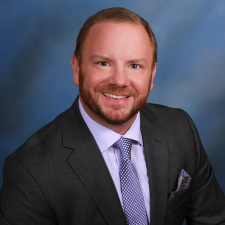
Name: Clay Cessna, DO
Specialty: Healthcare Executive
City: Dallas
County Medical Society: Dallas CMS
Social Media Handle: @AggieDoc (Facebook)
Why do you think your section is an important part of TMA?
The Texas Medical Association (TMA) LGBTQ+ section plays a crucial role within the broader organization for several reasons:
- Representation and Advocacy: The section ensures that the voices and perspectives of LGBTQ+ healthcare professionals and patients are represented within the TMA, which is essential for advocating for policies and practices that promote equitable healthcare for LGBTQ+ individuals in Texas.
- Education and Training: Providing CME and training opportunities for TMA members to increase their cultural competence and understanding of LGBTQ+ health issues, which then helps healthcare providers deliver more inclusive and affirming care to all patients.
- Addressing Healthcare Disparities: LGBTQ+ individuals face significant disparities in healthcare access and outcomes due to discrimination, stigma, and lack of provider knowledge. The section raises awareness, advocates for policy changes, and supports initiatives to improve LGBTQ+ health equity in Texas.
- Networking and Support: The section serves as a networking platform for LGBTQ+ healthcare professionals within the TMA. It provides a supportive community where members can connect, share resources, and collaborate on projects aimed at advancing LGBTQ+ health.
- Community Engagement: Section members engage with the broader LGBTQ+ community in Texas through outreach events, partnerships with advocacy organizations, and participation in Pride celebrations. By actively participating in community efforts, the section helps build trust and bridges between healthcare providers and LGBTQ+ individuals.
In summary, the Texas Medical Association LGBTQ+ section is important to TMA because it promotes inclusivity, education, advocacy, and support for LGBTQ+ healthcare professionals and patients, ultimately contributing to the TMA's mission of improving the health of all Texans.
What benefits have you derived from your membership in the section?
My participation in the TMA LGBTQ+ section not only benefits me professionally by enhancing my knowledge and skills but also allows me to make meaningful contributions to LGBTQ+ health equity efforts in Texas, ultimately improving healthcare outcomes for LGBTQ+ patients. I have been impressed with the collaborative nature of the group towards a variety of health initiatives and the diversity of representation within the group itself (people, perspectives, other organizations represented, and passions within healthcare).
What are some issues that the LGBTQIA+ community is facing that physicians should be aware of?
Physicians should be aware of several key issues that the LGBTQIA+ community faces, including:
- Healthcare Disparities: LGBTQIA+ individuals often experience disparities in healthcare access and quality due to discrimination, stigma, and lack of culturally competent care leading to delays in seeking care, inadequate treatment, and poorer health outcomes.
- Mental Health Challenges: LGBTQIA+ individuals are at higher risk for mental health issues such as depression, anxiety, and suicidality due to minority stress, discrimination, and rejection from family or society.
- Sexual and Reproductive Health: LGBTQIA+ individuals may have unique sexual and reproductive health needs that are often overlooked or stigmatized including LGBTQIA+ inclusive sexual health education, contraception, fertility services, and preventive screenings for sexually transmitted infections (STIs).
- Gender-affirming Care: Transgender and gender-nonconforming individuals may require access to gender-affirming healthcare. Physicians should be knowledgeable about these services and provide affirming care that respects patients' gender identities.
- Substance Use and Abuse: LGBTQIA+ individuals are more likely to engage in substance use and abuse, often as a coping mechanism for minority stress and discrimination, so proactive screening, intervention, and treatment referrals are important.
- Violence and Trauma: LGBTQIA+ individuals are at higher risk for experiencing violence, including intimate partner violence, hate crimes, and discrimination-based harassment. Physicians should know the signs of trauma and provide trauma-informed care.
- Barriers to Care: Structural barriers, such as lack of legal protections, insurance coverage exclusions, and discriminatory health care policies can impede LGBTQIA+ individuals' access to care.
By being aware of these issues and providing culturally competent, affirming care, physicians can help address healthcare disparities and improve health outcomes for LGBTQIA+ individuals.
How can physicians and organizations create an inclusive environment for LGBTQIA+ patients?
Physicians and health care organizations can take steps to create an inclusive environment for LGBTQIA+ patients through training and education, respectful actions and communication, inclusive policies/procedures, representation, and requests for feedback to improve. We can always do better to listen more and try to understand; thoughtfully taking a compassionate approach to all patients will encourage an environment of trust and inclusiveness.
- Training and Education: Offer training sessions and educational resources for healthcare providers to increase their knowledge and understanding of LGBTQIA+ health issues, terminology, and cultural competence.
- Respectful Communication: Use inclusive language and ask open-ended questions to create a welcoming environment for LGBTQIA+ patients. Respect patients' chosen names, pronouns, and gender identities, and avoid making assumptions about their sexual orientation or gender identity.
- Privacy and Confidentiality: Ensure that LGBTQIA+ patients' privacy and confidentiality are always respected. Provide a non-judgmental, confidential space for patients to discuss their sexual orientation, gender identity, and healthcare concerns without fear of discrimination or disclosure.
- Gender-affirming Practices: Implement policies and practices that support gender-affirming care for transgender and gender-nonconforming patients.
- Inclusive Policies and Procedures: Review and update organizational policies and procedures such as nondiscrimination policies, patient intake forms, and restroom policies to ensure they are inclusive of LGBTQIA+ patients.
- Diverse Representation: Promote diversity and inclusion within the healthcare workforce by recruiting and retaining LGBTQIA+ healthcare providers and staff. Having diverse representation can help LGBTQIA+ patients feel more comfortable and understood when seeking care.
- Community Engagement: Engage and build partnerships with LGBTQIA+ community organizations and advocacy groups to better understand the needs and concerns of LGBTQIA+ patients and provide support and resources.
- Patient Feedback and Evaluation: Solicit feedback from LGBTQIA+ patients about their care experiences to continuously improve services and address any concerns or gaps in care.
By implementing these strategies, physicians and healthcare organizations can create a more inclusive and affirming environment for LGBTQIA+ patients, ultimately improving their access to quality healthcare and health outcomes.
List any current or previous leadership roles within TMA including TMAF, TMAA, and other affiliated organizations.
My path with the Texas Medical Association started as a medical student. I was Vice Chair of the Medical Student Section and AMA Region 3 Chair. I have served on the TMA Committee on Membership (med student, resident, YPS), Patient-Physician Advocacy Committee, and as Section Representative (MSS, RFS, YPS) to the Texas Medical Association Foundation.
If you have served in a leadership role at TMA, please share what you gained out of the experience.
The experiences and lifelong friendships along the way are invaluable to a rewarding career in healthcare. You grow professionally - collegial interactions, passionate debate, and intellectual advancement in the art of medicine. Leadership roles within the Texas Medical Association sharpen your skills to better provide compassionate care to our patients.
Is there a cause, activity, or organization you're involved in that you would like to mention?
I have been a longtime advocate for the initiatives of the TMAF. From immunizations, child helmets, academic scholarships, and many others, the Foundation diligently works to address major health issues within Texas.
I serve as the Vice President of the Dallas Bears (dallasbears.org) and Co-Chair of our Texas Bear Round-Up (tbru.org) raising funds for local Dallas organizations; last year we donated over $147,000 to local charities.
I have also recently served as the Host Chair for the Taylor Hooton Foundation (www.taylorhooton.org) gala - addressing the negative impacts of performance enhancing drugs in our youth.
What do you like most about your specialty?
I get the joy of working in Clinical Operations. I first ventured into the compliance and billing nuances of healthcare, revenue cycle, and then fully launched into operations. I love that every day presents new challenges and that the overarching theme is finding ways to better serve large amounts of patients. I have always liked puzzles and I thrive on multitasking - so predicting issues and preparing solutions appeals to my senses of accomplishment.
Do you have a favorite quote or personal motto?
I stick with USE YOUR LIFE.
My parents were ardent proponents that life should not be about finding "happiness" but seeking purpose and meaning. They continue to inspire me to work hard at the things I love.

